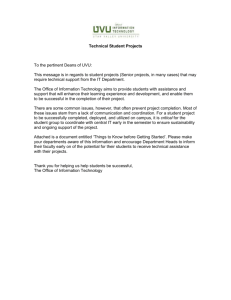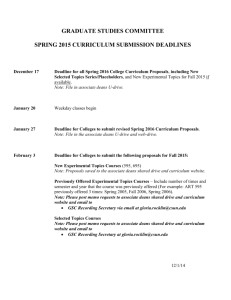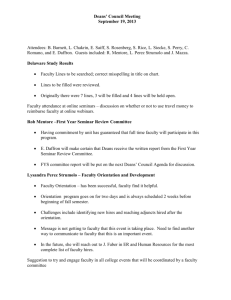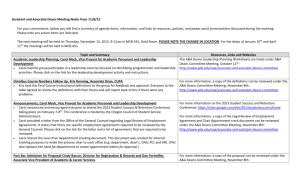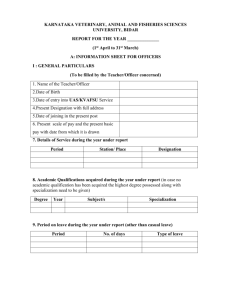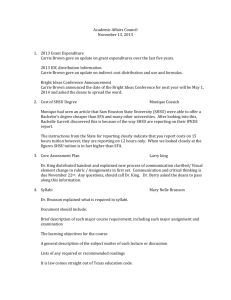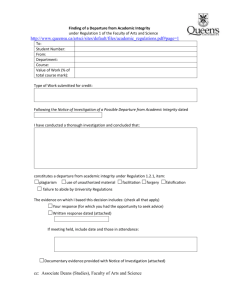Dean Team Meeting - Shoreline Community College
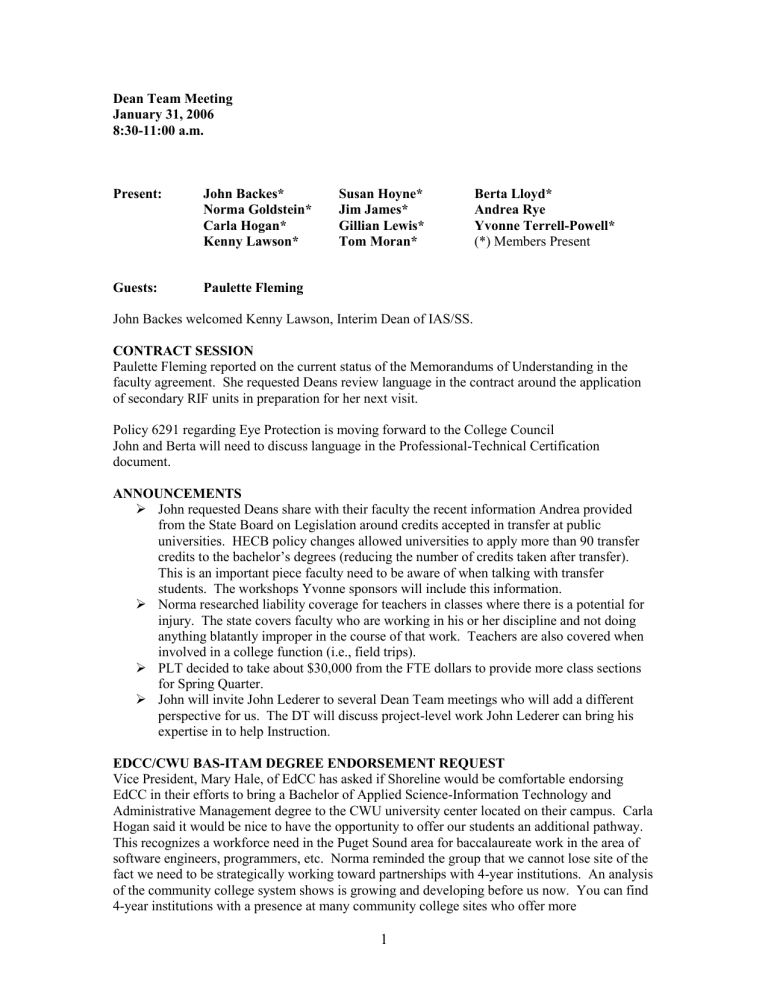
Dean Team Meeting
January 31, 2006
8:30-11:00 a.m.
Present: John Backes* Susan Hoyne*
Norma Goldstein* Jim James*
Carla Hogan*
Kenny Lawson*
Gillian Lewis*
Tom Moran*
Berta Lloyd*
Andrea Rye
Yvonne Terrell-Powell*
(*) Members Present
Guests: Paulette Fleming
John Backes welcomed Kenny Lawson, Interim Dean of IAS/SS.
CONTRACT SESSION
Paulette Fleming reported on the current status of the Memorandums of Understanding in the faculty agreement. She requested Deans review language in the contract around the application of secondary RIF units in preparation for her next visit.
Policy 6291 regarding Eye Protection is moving forward to the College Council
John and Berta will need to discuss language in the Professional-Technical Certification document.
ANNOUNCEMENTS
John requested Deans share with their faculty the recent information Andrea provided from the State Board on Legislation around credits accepted in transfer at public universities. HECB policy changes allowed universities to apply more than 90 transfer credits to the bachelor’s degrees (reducing the number of credits taken after transfer).
This is an important piece faculty need to be aware of when talking with transfer students. The workshops Yvonne sponsors will include this information.
Norma researched liability coverage for teachers in classes where there is a potential for injury. The state covers faculty who are working in his or her discipline and not doing anything blatantly improper in the course of that work. Teachers are also covered when involved in a college function (i.e., field trips).
PLT decided to take about $30,000 from the FTE dollars to provide more class sections for Spring Quarter.
John will invite John Lederer to several Dean Team meetings who will add a different perspective for us. The DT will discuss project-level work John Lederer can bring his expertise in to help Instruction.
EDCC/CWU BAS-ITAM DEGREE ENDORSEMENT REQUEST
Vice President, Mary Hale, of EdCC has asked if Shoreline would be comfortable endorsing
EdCC in their efforts to bring a Bachelor of Applied Science-Information Technology and
Administrative Management degree to the CWU university center located on their campus. Carla
Hogan said it would be nice to have the opportunity to offer our students an additional pathway.
This recognizes a workforce need in the Puget Sound area for baccalaureate work in the area of software engineers, programmers, etc. Norma reminded the group that we cannot lose site of the fact we need to be strategically working toward partnerships with 4-year institutions. An analysis of the community college system shows is growing and developing before us now. You can find
4-year institutions with a presence at many community college sites who offer more
1
baccalaureate opportunities. This is important for Shoreline’s viability as an institution in the long run.
Agreed: The Deans support Shoreline writing a letter of endorsement for
EdCC.
TO DO: Add to a future agenda a discussion on the areas of related baccalaureate degrees Deans had determined last year were possible for us to pursue. (Automotive; Communications Technology
(combination of Audio Engineering/Drama/Cinema/VCT);
Bilingual/Bicultural Education; and Biotechnology).
EQUIPMENT REQUESTS
Deans were provided a spreadsheet compiling the recent equipment requests. Berta Lloyd will review the list for items that would qualify for Worker Retraining and Perkins funds.
John reminded Deans that we will be refunded again in July with equipment dollars and will begin to order items to be in place for fall.
TO DO: John will find out from Beverly Brandt if the remodeled PUB will have new furniture.
TO DO: Deans will send requests for the displaced PUB furniture through
John Backes, who will work with Randy Stegmeier. The Office of
Instruction will track which classrooms are furnished with PUB tables or chairs.
Norma suggested for next year that the Deans develop a plan for looking at equipment needs. Do we want to buy pieces of equipment here and there, or do we want to get strategic and equipment one program really well? Do we want to ask programs to create a scalable plan that would stabilize them? There are several approaches we could take.
Deans will discuss how we prioritize and allocate funds for equipment. John would recommend programs have a logical, scalable plan that would take them to a certain place in instruction in terms of equipment over a period of a few years. There will never be enough money from the state. Programs that are equipment intensive will need to consider generating revenue.
Berta will have specific information on WRT/Perkins allocations in the next couple months. We need to continue conversations regarding a regional training center, shared equipment engaging partners, advisory committees, etc. to get our equipment. Berta will research what programs in the past have received large allocations from Workforce and Perkins.
NEW FACULTY POSITIONS
Requests for faculty positions include:
MLC Director
Mathematics
Criminal Justice
Biology
Transfer Composition/Developmental English
Developmental English/Transfer-level Composition
John acknowledged the sacrifices departments have made with faculty positions.
2
INSTRUCTIONAL GOALS
Deans reviewed very minor changes to the draft of the Instructional Goals. Norma reformatted it to get it on one page.
TO DO: Kerry will email the final version of the Instructional Goals to Deans and add a date of January 2006 to July 2007.
ONLINE COURSE PROPOSALS
Tom Moran distributed the list of proposals that the Dean Team will review on Friday, February
3. Carla will contact Fred Kuczmarski about the possibility of including a proposal for Math 211.
Yvonne will also check with the Counselors to see if they wish to bring Career Counseling forward. Courses selected will be fully online, 5-credit courses.
INSTRUCTIONAL VALUES
Norma distributed the list of Values the Deans had agreed upon with some background information. Deans thought some areas were redundant.
TO DO: Norma and Gillian volunteered to re-work the list of values. It will be put on Friday’s agenda.
PROGRAM REVIEW PILOTS
John will be shifting the Dean’s focus to looking at program review based on enrollment. Jim
James will be provided Deans with program data based on enrollment. Deans will be able to determine which programs are weak based on five years of declining enrollment.
OTHER
Class Cancellations. John distributed notes from the January 11, 2006 Faculty Senate meeting on their discussion about Adding/Offering/Cancelling Classes. Deans will review the Faculty
Senate’s recommendations to add a couple items to our guiding principles. (It is John’s expectation that Deans read all Faculty Senate [and Curriculum Committee] minutes regularly).
There is confusion regarding the 2/3 plus 1 and 75% enrollment.
TO DO: Once the Deans have reviewed and discussed FS recommendations,
John or another Dean will meet with the Faculty Senate.
Class Capacities. Jim James discovered that many class capacities on record are incorrect, which translates into reporting bad data. As a point of clarification, overloads in classes to not raise class capacities.
TO DO: The Dean Team will draft a college process for assignment of Class
Capacities and engage the Faculty Senate and Federation in reviewing the draft. This will be added as a future agenda item.
Class capacities in Dental Hygiene (they accept 24 students, but the capacity reads 30) illustrates a problem at the system level we need to address, and it needs to be addressed in a way that involves the Faculty Senate. The Deans will first establish a process for change, then figure out where the problems are and clean those up. If faculty have an issue around the size of a cap, we will compute the cost of that change. Faculty and administration share an interest in appropriately sizing each class to ensure quality and our ability to recoup our costs. Until we have a process in place, individual requests for capacity changes will not be entertained.
3
Deans will do some upfront work on this matter before taking it to the Faculty Senate and
Federation for their endorsement. Deans will develop a pilot process by identifying several of their worst class capacities and use working data as a base to discuss a process, and determine if we have the right criteria. Setting class capacities is ultimately a management decision.
Meeting adjourned 11:08 a.m.
Minutes Recorded by Kerry Fondren
4
